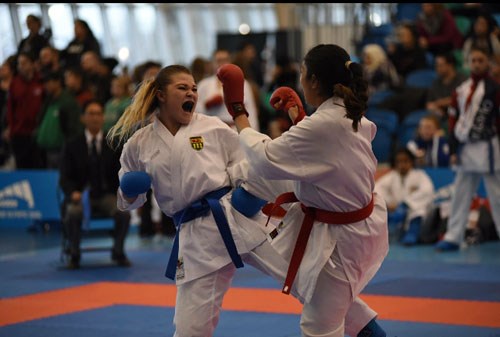Although she won't complete the final steps towards earning her black belt until September, 17-year-old karate competitor Marlee Cormier of Carlyle has already competed nationally as a member of Team Saskatchewan and now, as a member of the Sintani Wado Kai Karate Federation National Team, will compete for Canada internationally in Tokyo in 2016 and in Las Vegas in 2017.
“I found out I'd made the (national) team from a group email. I was definitely shocked and really honoured,” says Cormier. “It was really exciting and kind of a relief, because tryouts were so hard.”
Tryouts for national team contenders from Western Canada took place in Calgary from May 13-15. Cormier says the three-day exercise was gruelling, but she surprised herself with what she achieved personally.
“On the first day, it was all fitness-pushups, flex testing and more,” she says. “On day two, we did both kata and kumite. Kata is a sequence of movements you perform individually and kumite is basically fighting.”
“With kumite, they switched you around so everyone fought against every single person there. That's about 15 different people you're fighting. It's a hard enough workout that we were stopped every two minutes for water, Gatorade and an orange slice.”
“On the final day, they held a miniature tournament under competition conditions,” adds Cormier. “For me, the second day was definitely my strongest day, which really surprised me because it was the hardest workout and it went on for so long.”
“Before competition, I always feel a mixture of calm and excitement,” she says. “I'm a little jumpy and nervous, almost, but once I start, I calm down. But in kumite, if someone scores a point against me, them the adrenaline takes over. Normally, after a fight, that adrenaline rush is hard to calm down.”
Cormier says competing in Vancouver at the Karate Nationals in January 2016 as part of the first team Saskatchewan has ever sent to Nationals was an invaluable experience.
“To be a part of Team Saskatchewan and to represent the province was really cool. The entire experience was completely amazing and it really was a once-in-a-lifetime moment to compete at the Olympic Oval and seeing the Olympic rings was incredible,” she says. “That, and when the provincial flags were marched in... For me, I looked back to where I was when I first started and all of the hours I put in.”
“But it's never finished,” she says. “Every year, members of the national team have to compete for their spot, because each year, they look for a different skill set out of you. I try to eat as healthily as I can and I train at home. I do a lot of fitness and I work to keep my cardio up the best I can, because karate takes a lot of endurance. I work on my flexibility, too.”
A member of the Moose Mountain Wado Kai Karate Club-based in Carlyle-Cormier's interest in the sport began at an early age.
“When I first started karate, I was five or six-years-old,” says Cormier. “My cousin was in it, and that's how I first became interested. Once I started, I kept going and slowly as I went up, it became more competitive. I constantly pushed myself harder and harder and I pushed my limits to see how far I could go.”
“It didn't take long for me to realize that I enjoy karate. I didn't even think about it; it just became something that I kept doing.”
“I'm a brown belt now, but because I started so young, I went through every single rank and stripe. It took me a long time to get my brown belt. I waited tot up. Sensei Jayson (Humphries) didn't want me to get hurt, because I was young and tiny.”
“Before that, I had a purple belt for two years. To finally get my brown belt was amazing, definitely. I've passed black belt pre-grading and I go for my black belt this September or October.”
In addition to the competitions in Tokyo and Las Vegas, Cormier will spend many weekends in Calgary while training as part of the national team.
“I've already missed a lot of Fridays,” she says. “And on a lot of Mondays, I'm present, but I'm not really present,” she smiles. “But my teachers have been so helpful and they've really been understanding about my schedule. I owe them a big thank you.”
“Karate has taught me a lot-self-defense, self-discipline and respect are so important and all of the senseis have taught me those things,” adds Cormier. “And they also each have their own way of teaching karate, so all of those different variations are things that I've learned and that have helped me get to this point.”
“My parents never pushed me, but they've always supported me,” she says. “They let me go at my own pace, helped me along the way and when I went through a phase of thinking I might quit, they helped me through that phase.”
“And my friends all know how important (karate) is to me and support me through.”
When asked if competing at the Olympic level is in her plans, Cormier simply says: “Karate's constantly in my head and I can't imagine not sticking with it. It would be amazing to compete in the Olympics, but I'll just keep on competing and see where it goes.”




